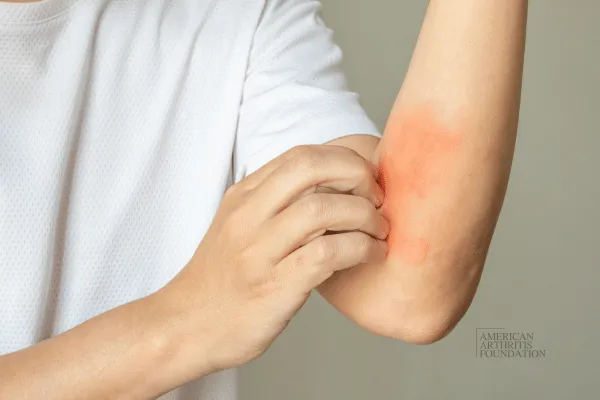Guidance and Tools for Those with Rheumatoid Arthritis
Rheumatoid Arthritis (RA) - a complex autoimmune condition impacting more than just joints. From the eyes to various organs, RA can be widespread, but there's hope. Learn about the powerful treatments available to manage and mitigate its effects.
Living with rheumatoid arthritis (RA) is a unique experience for each individual. Whether you're newly diagnosed or have been managing RA for years, having the right information and support can make a world of difference. Understand the diagnosis process, explore treatment options, and tackle daily obstacles. Here, you'll discover a supportive community of fellow RA warriors, tips to remain active and manage your condition, and avenues to champion not only for yourself but for others too."

The Surprising Connection Between Psoriasis and Joint Pain: What You Need to Know
When you think of psoriasis, you probably picture those red, flaky skin patches that can cause discomfort and self-consciousness. But what if we told you that psoriasis doesn’t just affect your skin—it can impact your joints too? In fact, up to 25% of people with psoriasis experience joint pain, and for some, that pain turns into a more serious condition known as psoriatic arthritis (PsA).
It’s a connection that surprises many, but researchers are actively studying it. And the results could transform how we approach psoriasis and arthritis, helping people live healthier, pain-free lives.
So, What Is Psoriatic Arthritis?
While psoriasis primarily affects the skin, psoriatic arthritis (PsA) is a type of inflammatory arthritis that impacts the joints. It can cause swelling, stiffness, and pain, which can be just as uncomfortable as the skin symptoms of psoriasis, if not more. What’s more, PsA can develop silently in some people, without obvious skin symptoms beforehand.
Here’s where things get interesting: about one-third of people with psoriasis may eventually develop PsA. This means that many people who currently deal with psoriasis are at risk of future joint pain—but experts are working hard to figure out why this happens and how to stop it before it starts.
A Global Effort: The HIPPOCRATES Project
In an exciting effort to better understand the link between psoriasis and joint pain, researchers from Oxford University, University College Dublin, and other leading institutions are conducting a massive international study called the HIPPOCRATES Project. The goal? To uncover early warning signs of PsA and find ways to prevent it from developing in people with psoriasis.
So far, the project has been tracking nearly 3,000 psoriasis patients, with 25% of them already experiencing joint symptoms. But this is just the beginning. Over the course of three years, the study will follow these patients, gathering insights into when and why PsA appears—and how it can be stopped.
How Are They Doing It?
What makes the HIPPOCRATES Project so groundbreaking is the scope and the approach. Researchers are collecting detailed health information from participants through online questionnaires and even using finger-prick blood samples that people can send in by mail. This allows patients to participate from home, no matter where they live, and ensures that researchers gather a large, diverse pool of data.
The project plans to recruit 25,000 people with psoriasis across 12 European countries, giving scientists an unprecedented amount of data to analyze. This data could lead to the discovery of key risk factors that predict who will develop PsA, opening the door to early interventions.
Can PsA Be Prevented?
The ultimate goal of this study is to find out if we can prevent psoriatic arthritis from developing in the first place. And while there’s no magic pill just yet, researchers are exploring a variety of lifestyle interventions that could help. These include things like:
Regular exercise to keep joints healthy
Stress management techniques to reduce inflammation
Dietary adjustments to support overall well-being
The idea is that by identifying high-risk individuals early, we can recommend simple changes that might keep arthritis at bay and improve quality of life.
Why This Study Matters
Psoriatic arthritis can be life-altering. It doesn’t just cause joint pain—it can also affect mobility and lead to long-term joint damage if left untreated. That’s why the HIPPOCRATES Project is such an important step forward in our understanding of psoriasis and arthritis.
By focusing on early detection and prevention, this research could dramatically change how we treat people with psoriasis, giving them tools to manage their skin and joint health long before PsA develops. Plus, with so many patients involved from different countries, the findings are likely to have a wide-reaching impact.
What’s Next?
As the HIPPOCRATES Project continues to unfold, we’re hopeful that its discoveries will lead to better treatments and even preventative measures for PsA. And at the American Arthritis Foundation, we’ll be watching closely to bring you the latest updates on this groundbreaking research.
If you or someone you know is living with psoriasis, staying informed about this connection between skin and joint health is key. Whether through lifestyle changes or new treatments on the horizon, there are steps you can take to protect your joints and improve your overall well-being.
Stay tuned for more on the link between psoriasis and joint health—and follow us for the latest in arthritis research, treatment options, and wellness tips!
Join the Conversation
Do you have psoriasis or PsA? We’d love to hear your story! Share your experiences with us in the comments below and let’s keep the conversation going about how we can make life with psoriasis and joint pain easier for everyone.
Have a question?
We're Here to Help
By providing my phone number, I agree to receive text messages from the business.


